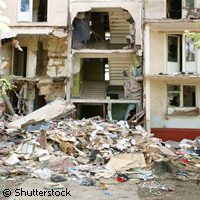EU-funded technology helps rescue workers save lives
Tragic crises, such as the recent earthquakes in Chile and Haiti, prove how crucial the coordination of relief work is for saving lives. The EU-funded WORKPAD ('An adaptive peer-to-peer software infrastructure for supporting collaborative work of human operators in emergency and disaster scenarios') project rose to the challenge of giving relief work a boost by developing innovative software, models and services to enhance collaboration between disaster workers. Rescue teams can communicate on the ground with handheld devices, enhancing the efficiency of complex relief operations. WORKPAD was supported with EUR 1.85 million under the 'Information society technologies' (IST) Thematic area of the Sixth Framework Programme (FP6). 'When an earthquake, forest fire or flood hits, we need to deploy all our available resources to save as many lives as possible and to provide urgent rescue services,' stressed EU Commissioner for the Digital Agenda Neelie Kroes. 'EU research funds have helped to develop a great ICT (Information and communication technologies) tool that makes emergency response even better and faster.' Disaster workers need to communicate efficiently to coordinate their work on the ground - be they from the army, the Red Cross, a volunteer organisation or a government department. Leaders of rescue operations need an overview of complex crisis situations, as well as fast, detailed information about where, when, and what kind of action is needed. The WORKPAD researchers worked simultaneously on two complementary aspects of a novel technology to improve this coordination in a reliable and flexible manner. First, the researchers designed a back-end framework that integrates large amounts of data, linking up dozens of databases from different organisations, and centralising the information in one dispatch point in order to improve response time and avoid duplication. The WORKPAD consortium also developed front-end 'peer-to-peer' services, allowing disaster workers to communicate via small wireless handheld devices. In addition, they tackled specific needs and challenges of emergency work, such as the small screen size of portable devices, the unavailability of reliable communication networks and scarce power supply. Relief team leaders using WORKPAD software can keep track of the location of all their team members in real time, and define their role, reassign them to a more urgent task if needed, or provide them with step-by-step instructions. Rescue workers can also share and consult useful information available on the network, such as the names of people living in a collapsed apartment building, school class lists, or maps. WORKPAD brought together eight partners from four European countries, including top-level researchers from public universities such as the University of Rome La Sapienza, and private companies like IBM Italy. Key contributions were also made by the homeland security department of the Calabria region in southern Italy, which suffers from frequent forest fires in the summer, and occasional earthquakes. There, the WORKPAD team tested the technology successfully in a real-life setting. The technology is now available to deploy anywhere in the world. WORKPAD is a striking example of a useful ICT tool that was developed thanks to EU research funding. Many such success stories will be presented in Brussels in September at 'ICT 2010'. This large-scale three-day event is open to all researchers, business people, investors and policymakers interested in ICT research and innovation. It will feature prestigious speakers, such as Commissioner Kroes as well as Hans Vestberg, the chief executive of Swedish telecom Ericsson.
Countries
Italy



